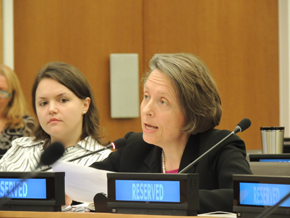September 24, 2018
Mercy Day
Speaking on behalf of the Sisters of Mercy, Mercy International Association at the UN and the Mining Working Group, Sr. Aine O’Connor (pictured), described at the November 27, 2013 Fifth Session of the Open Working Group (OWG) how our members and partners worldwide are impacted by unsustainable energy generation – especially coal mining, biofuels, hydroelectric power, and now fracking for shale or coal-seam gas.
 Based on the experience of members, she admonished that promoting these energy options is favoring short-sighted economic and profit motives over environmental sustainability and peoples’ rights.
Based on the experience of members, she admonished that promoting these energy options is favoring short-sighted economic and profit motives over environmental sustainability and peoples’ rights.
To achieve a truly transformative sustainable energy agenda, she then outlined three key steps going forward:
First, Member States must agree on a rights-based definition of Sustainable Energy for All.
Such a definition is informed by human rights principles and obligations, giving priority to disadvantaged and marginalized groups, especially women and children, to the rights of future generations, and to vital ecosystem protection. She urged Member States to test their understanding of modern energy services against this definition.
Second, Member States should incorporate into States’ energy policy determinations a human-rights litmus test.
The litmus test that the Mining Working Group at the UN has developed includes the following questions:
1. Does the energy option cause, contribute to, or depend on the violation of human rights, or vital ecosystem destruction?
2. Does the energy strategy contribute to disadvantaged or marginalized groups, especially women, being able to enjoy a greater exercise of their rights?
3. Can affected communities safely and effectively participate in the assessment of these questions?
4. What is the assessment of these questions when applied to future generations?
Finally, Member States are invited to adopt energy nexus targets and indicators based on the rights to health, food, and water
For example, targets could include the following actions:
The message was well received by the Open Working Group co-chairs, Ambassador Csaba Korösi of Hungary and Ambassador Macharia Kamau of Kenya, as well as the audience present. A copy of the detailed statement is attached. Click here on Oral Intervention to watch the video; Sr. Aine’s intervention can be found at minutes 24:45 to 27.51 on the video.
For a detailed account of the Energy discussion during the 5th OWG, you are encouraged to read the United Nations - Non-governmental Liaison Service's (UN- NGLS) account in Open Working Group on Sustainable Development Goals debates how to achieve universal energy access in a carbon-constrained world at
One of the main outcomes of the United Nations Conference on Sustainable Development (Rio+20), held in Rio de Janeiro in June 2012, was the agreement by Member States to launch a process to develop a set of sustainable development goals (SDGs).
Rio+20 did not elaborate specific goals but stated that the SDGs should be limited in number, aspirational and easy to communicate. The goals should address in a balanced way all three dimensions of sustainable development and be coherent with and integrated into the UN development agenda beyond 2015. A 30-member Open Working Group (OWG) of the General Assembly is tasked with preparing a proposal on the SDGs.
To learn more about the United Nations sustainable development agenda, especially the work of the Open Working Group, go to: UN Sustainable Development Knowledge Platform
Readers are also highly recommended to sign up to receive updates and publications from the UN-NGLS
About the Mining Working Group (MWG) at the UN
The MWG at the UN is a coalition of NGOs, of which Mercy International Association at the UN is an active member. In partnership with members and affected local communities the MWG advocates at and through the UN for human and environmental rights as related to extractive industries. The MWG works for improvements in national and international law, policy and practice to ensure that extractive activity meets and upholds the highest human rights standards; cedes to ecological limits and planetary boundaries; and contributes to just and responsible economic, social, and sustainable development for the host country, with a priority for the local communities most directly affected.
At earlier OWG sessions this year, the MWG made four interventions on the extractive model of development. The first was on Poverty and Mining The second was on Water and Mining, the third and fourth were on Jobs and Mining and Health and Mining.
Messages to: Áine O’Connor rsm - MGA Co-ordinator at the UN